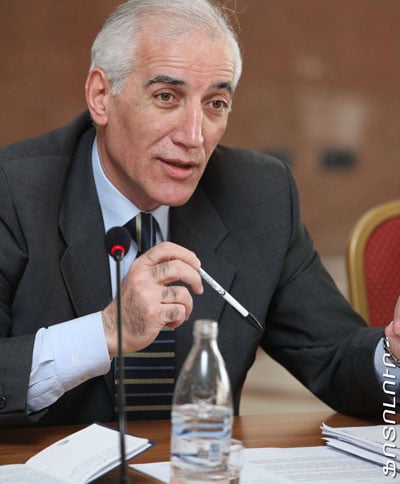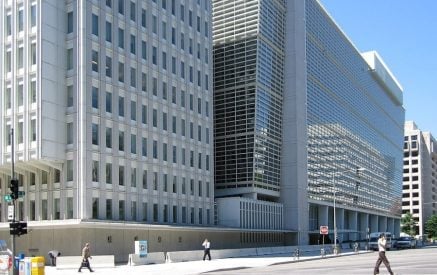Allocation of new financial assistance of 843 million dollars to Armenia by the World Bank, which was recently stated by the bank representatives, according to the Armenian National Congress (ANC) member, economist Vahagn Khachatryan, is a sponsorship of corruption in Armenia rather than support.
The economist came to this conclusion by studying the World Bank’s (WB) activities in Armenia for long years. In recent years, as asserted by Vahagn Khachatryan, the WB seems to displaying a kind of indifference, and does not thoroughly inspect whether the funds allocated thereby are actually serving the purpose, or how they are spent.
Comparing the World Bank’s works with those of the 90s and in recent years, Mr. Khachatryan noted that now this structure, and even the International Monetary Fund, have dropped their ratings and are providing non-objective assessments.
Read also
“In the 1990s, the works accomplished by the World Bank and IMF, one might say, were impeccable. Opponents were always giving negative assessments, for example, that their main task was focused on non-development of the industrial capital in Armenia, rather than to services, trade and service sectors, although this is a subjective approach, but there was a criticism. Actually, at that time they set a goal to establish real institutions in Armenia for the new society. After 2005, based of their annual and current reports, they provide non-objective assessments to the situation or are unaware of the situation,” said Mr. Khachatryan in the conversation with “Aravot”.
Although, Mr. Khachatryan strongly doubts that the World Bank does not control the situation, on the other hand, raises a question, “The steps that must be offered to the authorities of Armenia, are not made, and they do nowise want to affect these steps when they have the leverages to do so, they can conduct an audit.”
To the question of “Aravot” why the World Bank act so and issues new loan, Mr. Khachatryan said, “The World Bank’s loans are to solve problems in specific fields, but once these problems are not resolved, we can conclude that a political subtext is operating in the World Bank, and it is also the matter of own image. They have to, somehow, justify their activities in Armenia that were failed. However, more funds are allocated under the fight against corruption. If the justice system is not established, and if the citizen of Armenia or a businessman is vulnerable to state interferences, not everyone is equal before the law, then I cannot understand their assessments and new loans.
They say that business registration has become easier, corruption risks are reduced, and the important thing is not to have quick registration, but how they work. As a result, we see that the SME’s unit weight is diminishing, small enterprises are becoming few, middle class is not formed, the rich get richer, the poor get poorer, the businesses of those standing close to the authorities and oligarchs are getting better, in other words, there is no progress, but still they release funds.”
With regard to the Bank’s 2014-17 Strategic Plan in Armenia, the ANC member says that it is just a pile of words, and does not inspire confidence.
“Under the strategy, Armenia will receive assistance, support in establishment of competitiveness and job creation, facilitation of conducting business, export and tourism promotion, and improved access to finances for SMEs,” says a World Bank plan. “This says nothing to me, this was before, and I am convinced that it was not accomplished previously either. It is written that the document is based on the development strategy of Armenia up to 2025. There is a big bluff here. As of today, the Republic of Armenia cannot predict up to the year 2025, even to its best wishes and abilities.
WB says improvement of productivity in agriculture, which can result in greater economic growth, which would result in total well-being and rapid reduction of poverty. So, didn’t we know that the improvement of productivity will lead to economic growth? What a big discovery! I assure you, there is nothing in the agricultural sector.
If we divide the gross output of this sector and employment in agricultural, we get a ridiculous figure: approximately 780 billion drams in case of 450 thousand employed.” In the same strategy, it is written that support will be provided to improve the anti-corruption events initiated in management and public services sectors, the strategy will help to review existing anti-corruption events, improve efficiency public administration, and enhance public financial management reforms. In this regard, Mr. Khachatryan expressed his bewilderment, “Actually, the corruption goes deepens in Armenia, and I do not also understand what the financial management reforms is. Even if they point out the state procurements or at least study, then they will see fantastic risks of corruption. For instances, 100 million drams was designed for public awareness activities on mandatory accumulative pension program, now a question, is the public informed, of course, not.
In this system, the corruption is on the first line, accordingly, the goal is the corruption, and not the improvement of productivity, and so on, and accordingly, such a financial program can not promote to what they are talking about.”
To our observation why the World Bank does not follow the results of its allocated funds, perhaps, because it is a loan and they are going to get their revenues anyway, Mr. Khachatryan said that it is advantageous to them that Armenia be a corrupt to be easier for control and influence. “Hungary required shutting down of the World Bank office, accusing that you issue a loan, and then you are going to get those funds back on the account of the taxpayers, but you are not interested in the outcome of this financing. In fact, they are not interested in Armenia, anyway, they care about the money received back.”
Nelly BABAYAN



























































